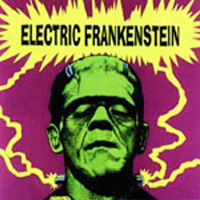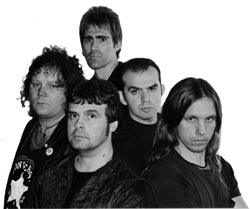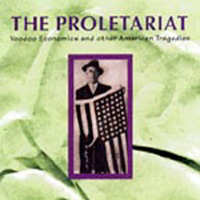 Electric Frankenstein
Electric Frankenstein
I’m Not Your Nothing (Victory)
An interview with Sal Canzonieri
by Jon Sarre
Meaner than Dracula after they shut him off at the blood bank and snarling like the wolfman when bluemoonballs make him wanna take out his frustrations on the Mummy, here’s a creature borne of parts ripped from ’60s American garage rock, ’70s New York punk, mid-’80s hardcore and a generous helping of metallic shellac (for weather protection, maybe). Electric Frankenstein, as the beast is known, has been generously subjecting the planet to release after release since back in 1992 when they (principally lead-guitarist Jim Foster, ex of Adrenaline O.D. and Holy Rollers, rhythm axeman Sal Canzonieri, formerly of the Thing and Doom Patrol and bass player Don Canzonieri, late of Christian Death) got it in their heads that rock’n’roll wasn’t quite ready to be a corpse. A few line-up changes here and there (for singers, there’s been Steve Miller o’ Crash Street Kids, Scott Wilkins of Verbal Abuse fame, special guest and Negative Trend/F-Word vet Rik L. Rik and then Miller, presently back for a second time, and Rob Sefcik has the distinction of being drummer number 4 – I think) make for different names on the sleeves, but that hasn’t changed their jacked-up punkrockitude (or slowed their productivity).
Twice now I’ve been fortunate enough to sit down with Sal Canzonieri (okay, it was only supposed to be once, but the first time, the dog ate my tape recorder, sorry) and discuss the essentials of monster construction (tho’ we never got around to the all-important “Does A Monster Really Need a Spleen?” question).
For the second attempt, I hung around the house and waited for the crucial conference call from the folks at Victory (the label’s got the bill for the new EF longplayer). That came up and, with it, a few minutes of fiber optic noodling ‘fore Sal was patched in. Humility reigned as I profusely apologized for not gettin’ it right the first time and then Sal related a similar experience he’d had.
So you wanna check it out [the tape]?
Yeah… it’s pickin’ up this time… Is [the press thing] a drag yet?
Nah, it’s easy enough, I like it and [stuff’s happening], we’ve been playing on the radio, in London on the five big commercial radio stations… in New York and Chicago, too… big ones and college ones. It’s takin’ off the first week and that usually doesn’t happen.
They’ve been playin’ the new single [“I’m Not Your (Nothing)”] on commercial radio stations?
Yeah, the college stations are playin’ the Tubes cover [the single’s b-side, “I Was a Punk Before You Were A Punk”].
When you guys first got together it was like, ’92, right? And what did you think of the situation back then?
At the time… with all this commercialism in music, it became a front basically… the whole rock’n’roll thing was not being given to people who wanted to hear it. We started playin’ it for ourselves between our other bands. We’d just stay a couple hours late after practice. People would see our rehearsals and tape them and give ’em to people at clubs. We started getting shows. Within a year and a half, you started seein’ the band break through. People started recognizing it.
 What were you guys looking for?
What were you guys looking for?
Excellent music that you can sing along to and remember the lyrics and make it mean something, like I remember the first Damned single I heard, the first Black Flag, the first Stooges, the first Black Flag [laughs], I said that already. I said, “I wanna write songs like that.” We worked by feeling, we went by the way things felt. People tell us that, too. They feel stuff through our music. It’s what people say, kids, all kinds of people say that.
Is there anyone else out there who has that feeling that you guys are tryin’ to capture?
The Lazy Cowgirls… when they’re good, they’re loud and powerful.
They’re almost kinda slick sometimes.
They’re slick when they do covers, cuz they’re too close to the originals…. The Donnas… sometimes when the sound is bad, cuz the guy doesn’t take it seriously cuz they’re girls or whatever, but when the sound guy’s into them they’ve impressed me to no end. Zeke, in the beginning, but they play too fast now… if you do everything fast it turns into a big blur… when we play too fast we start losing the girls…
Girls don’t like that, what’s…
They like things to have a more up and down flow to it… We pace ourselves… I was a DJ for like four years. I know how to work the audience. We construct the set lists with the audience in mind. We make a set list that moves people so they can get into the show that way. You know what’s really impressing me lately? Stoner rock…
Like who?
Like Nebula, they’re a three-piece and they just rocked!
When you’re talkin’ “Stoner Rock,” do you mean, like Queens of the Stone Age?
Yeah, them too… I’m tryin’ to think of other bands… The Hellacopters.
Did you gig with them in Europe?
No, but they came to see us in Sweden. We played with ’em at CMJ. It’s just not like it used to be. I remember, in the past, it was always tingling, there was always that feeling. I saw Black Flag with Dez and with Henry, I saw the Misfits, the Ramones, Alice Cooper… I think [that’s why] our songs are appealing, cuz I’m bringing out the best of everything.
Instead of just using a style…
Yeah, I’m not being a ska person. I’m continuing, not regurgitating… Today people are more smarter than ever… but more jaded.
Too much information.
They don’t want pop. I don’t think the majors are giving people what they want. It’s not fair for people who aren’t dumb anymore. People know what they want, they just need to get it.
Do they [the major labels] know you guys? Do they know who you are?
Yeah, I see ’em all up front.
Do they ever approach you?
Yeah, it’s always “I’m really interested, maybe one more record,” but I’d rather… I believe in the whole grass roots thing. We’ll break up when people don’t care anymore. People made us play live, people made us put records out. I thought that was the real way to do it instead of manufactured bands, manufactured scenes… You know, like Grand Funk…
Yeah, they were one of the biggest bands of the ’70s, yet they weren’t up there in the history like in Rolling Stone… They didn’t wanna admit that people liked ’em and when they did, they were always like “Why do people like this stuff?” It’s the same with metal… like, “It’s so dumb.”
It’s a corny thing, like the Billy Corgans of the world [making self-indulgent “post-rock” records], they were proven wrong. People want rock bands. We’re at a ten year low in radio [listenership], a 60% drop in record sales, all that from not giving people what they want.
Do you have any idea how many records you have out?
I could look it up for you on the Internet, I guess.
Just give me a rough guess.
We’ve got seven LPs, but three official. The new one is coming out, How To Make a Monster. Singles, there’s about fifteen, maybe more, twenty-five to thirty compilations and I say “No” to lots of people.
You must get the crazy offers… Now, is there a benefit to doin’ stuff on so many labels, I guess distribution’s a given, cuz you’re obviously gonna get your stuff out to a broader geographical base in all kinds of cities, is there more of an advantage to not putting all your eggs in one basket?
Definitely. We care about what the people want. I deliberately want to be on a whole buncha labels. I don’t wanna be narrowly focused, labeled, then it wouldn’t’ve become what it’s become. We get lotsa metal guys with Slayer and EyeHateGod T-shirts and garage people from Estrus and Get Hip, rock’n’roll people, stoners from Man’s Ruin. I’m all for the resumption of the “gathering of the tribes.” Factionalism is bad for kids, like when we grew up, all we cared about was, “did it rock?” The Stooges, what was that? There was no “punk.”
No metal, either.
Right, what was Black Sabbath? They rocked. Everybody shouldn’t hate each other, like the gutter punks only like their five favorite bands, the same eighty people.
The same eighty people they started with.
It’s not like you just wanna get big, we’ve been accused of “trying to get big” and that’s just ridiculous. You start to realize what you do reflects on a lot of things, things that people can appropriate, like an earring, anyone can wear an earring, or pink hair, or a mohawk… like, “you’ve gotta have this exact leather jacket, or you’re stupid.” We wrote that song “You’re So Fake” about that: people who don’t understand, you’re doing it for everyone, not just for them.
Right, why would you wanna keep your music a secret, so only your friends come out to see you?
Okay, so pay me to live in your living room and I’ll play there whenever you want. The other thread is a version of PC. The whole point of punk rock is you don’t have to fit in like pseudo hippies, that’s what those people remind me of, hippies in punk clothes.
After some talk about subculture, fashion and other peripheral non-music shit, I asked Sal about their rare stage appearances outside of NYC.
Touring is a big trick, cuz even indies… they’ll sign you and stick you in Europe. Know why? So you don’t know they’re not doin’ anything for you here. A common sense person wouldn’t do that. Doesn’t it only make sense to play in a large city on a weekend? When we play Chicago… we have people who drive like two hours from five different states cuz they know they gotta do that if they wanna see us.
I broke the rules. I didn’t tour, I change labels, we sell 70,000 and someone on a major who does everything sells 20,000. You gotta build up a following, locally at first. This is the way it happened in the ’50s and ’60s. The big companies, the David Geffens, didn’t step in ’til like ’68.
Hey, I think this interview was better than last time.
Yeah, hopefully it took.



